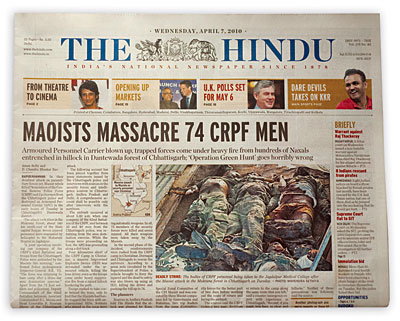 |
The fear was palpable along the Konta-Dantewada highway in south Chhatisgarh in November 2007. In a village off the highway, very close to Chintalnar where Naxalite Maoists massacred 76 Indian security personnel on Tuesday,
a tribal leader told us, "This war will continue for at least ten years."
Thousands of displaced tribals were housed in makeshift camps by the road under the government's ill-thought out and destructive Salwa Judum campaign. This involved forcing tribals out of their homes, creating strategic hamlets, then deploying tribal youth to fight against the Maoists. The Maoists viewed tribals living in these camps as government agents, and often attacked them.
Since then, the government has rethought the Salwa Judum campaign. But the alienation it bred is starkly visible. Sandwiched between an often absent, coercive state and brutal Maoists who were at least embedded with villagers, many opted for the rebels. This week's operation would not have been possible without local support.
Kashmir, the Northeast and Punjab have shown that the Indian state is enormously resilient, can absorb shocks and has a high bleeding capacity. But the challenge from the tribal-dominated, mineral-rich areas of central and eastern India will test the government in newer ways.
In these pockets, young men and women do not see the state at all. Abujmadh, where Arundhati Roy travelled to write her gushing essay on the Naxals, is an area the Indian state has never even surveyed. If the government does appear, it is not in a welfarist but predatory avatar.
Inequitable policies, absence of justice, land issues, a corrupt administration, a dearth of mainstream political actors, forced displacement, and insensitivity to non-violent movements have helped create space for an armed outfit that questions the legitimacy of the political system. What is happening here is an exact replica of how the Nepali Maoist movement evolved.
Raise popular issues; mobilise people; eliminate key local rivals; exert exclusive control over key base areas; force the state to unleash a violent operation to expose its 'real character'; utilise human rights violations to expand the recruitment base; and pursue political and military tracks simultaneously. The violence escalates until a stalemate forces a rethink.
There has also been speculation that India's internal conflict will harden its position on Nepali Maoists. Given Home Affairs Minister P Chidambaram's hardline security focus, and the fiercely anti-Naxal mood among Indian parliamentarians and sections of the liberal media, this is possible. Right-wing hawks and some cops continue to assume deep operational links between the Nepal and Indian ultra-left movements. And it could be politically more difficult for the establishment to sell a reconciliatory line towards Nepali Maoists when they are waging a 'war' against Indian Naxals.
But this is not the whole picture. India's views on Nepal's Maoists did not change last year because of the Naxal factor. In fact, many in Delhi have been citing the Nepal example to lure Indian Maoists into 'mainstream' politics.
At the core, it was the perception that Nepali Maoists were shifting goalposts on multiparty democracy that disrupted India's relationship with them. They were also seen as insensitive to India's security concerns on a China keen to expand its influence. Things went sour because of what was happening within Nepal, not the conflict within India.
As Professor S D Muni said in an email interview, "Indian Naxal concern is an issue but not of major proportions because the Maoists on their own would also be cautious in pitching themselves against India in the long run. Maoist links with the Indian Naxals never exceeded logistic support for themselves, ideological affinity for the international and South Asian image and limited personal sympathies."
This view was reiterated by Delhi-based security expert Ajai Sahni, who otherwise has been critical of India's post-2005 Nepal approach. He told us, "Policymakers here know that Indian Maoists have been critical of the Nepali Maoists. There will be no impact on Nepal policy."
Those in Delhi and Kathmandu who want to marginalise Nepali Maoists will indulge in some scaremongering. But informed officials know these are different boxes. Nonetheless, Nepali Maoists will have to be extra-careful in their dealings with Indian Naxals, and sensitive to what is being billed as India's newest 'war'.



